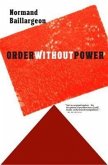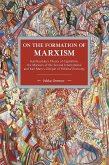Eugene Gogol
Towards a Dialectic of Philosophy and Organization
Eugene Gogol
Towards a Dialectic of Philosophy and Organization
- Broschiertes Buch
- Merkliste
- Auf die Merkliste
- Bewerten Bewerten
- Teilen
- Produkt teilen
- Produkterinnerung
- Produkterinnerung
Philosophically engaging, and practically oriented, this book asks whether philosophic clarity can account for effective revolutionary organizational practice.
Andere Kunden interessierten sich auch für
![The Dialectic of Position and Maneuver The Dialectic of Position and Maneuver]() Daniel EganThe Dialectic of Position and Maneuver25,99 €
Daniel EganThe Dialectic of Position and Maneuver25,99 €![Critical Practice from Voltaire to Foucault, Eagleton and Beyond Critical Practice from Voltaire to Foucault, Eagleton and Beyond]() John E O'BrienCritical Practice from Voltaire to Foucault, Eagleton and Beyond44,99 €
John E O'BrienCritical Practice from Voltaire to Foucault, Eagleton and Beyond44,99 €![Order Without Power Order Without Power]() Normand BaillargeonOrder Without Power13,99 €
Normand BaillargeonOrder Without Power13,99 €![On the Formation of Marxism On the Formation of Marxism]() Jukka GronowOn the Formation of Marxism30,99 €
Jukka GronowOn the Formation of Marxism30,99 €![The Revolutionary Marxism of Antonio Gramsci The Revolutionary Marxism of Antonio Gramsci]() Frank RosengartenThe Revolutionary Marxism of Antonio Gramsci30,99 €
Frank RosengartenThe Revolutionary Marxism of Antonio Gramsci30,99 €![State and Revolution in Finland State and Revolution in Finland]() Risto AlapuroState and Revolution in Finland30,99 €
Risto AlapuroState and Revolution in Finland30,99 €![War and Revolution in Catalonia, 1936-1939 War and Revolution in Catalonia, 1936-1939]() Pelai Pagès I BlanchWar and Revolution in Catalonia, 1936-193930,99 €
Pelai Pagès I BlanchWar and Revolution in Catalonia, 1936-193930,99 €-
-
-
Philosophically engaging, and practically oriented, this book asks whether philosophic clarity can account for effective revolutionary organizational practice.
Produktdetails
- Produktdetails
- Verlag: Haymarket Books
- Seitenzahl: 416
- Erscheinungstermin: 11. März 2014
- Englisch
- Abmessung: 228mm x 155mm x 25mm
- Gewicht: 563g
- ISBN-13: 9781608463411
- ISBN-10: 1608463419
- Artikelnr.: 37722725
- Herstellerkennzeichnung
- Libri GmbH
- Europaallee 1
- 36244 Bad Hersfeld
- gpsr@libri.de
- Verlag: Haymarket Books
- Seitenzahl: 416
- Erscheinungstermin: 11. März 2014
- Englisch
- Abmessung: 228mm x 155mm x 25mm
- Gewicht: 563g
- ISBN-13: 9781608463411
- ISBN-10: 1608463419
- Artikelnr.: 37722725
- Herstellerkennzeichnung
- Libri GmbH
- Europaallee 1
- 36244 Bad Hersfeld
- gpsr@libri.de
Eugene Gogol is a Marxist-Humanist activist-writer. His books include The Concept of Other in Latin American Liberation and Raya Dunayevskaya: Philosopher of Marxist-Humanism.
Introduction: Philosophy, Organization, and the Work of Raya Dunayevskaya
I. The Contradictory Reality of the Present Moment and Its Relation to a
Dialectic of Philosophy and Organization
II. The Project of Dunayevskaya: Dialectics of Organization and Philosophy
III. The Form for the Present Study
Prologue: The Dialectic in Philosophy Itself
I. What Is Hegel's Journey of Absolute Spirit?
II. Why a Negation of the Negation?
III. Can We See Hegel's Absolutes, Not as a Closed Totality, but As New
Beginning?
PART I: ON SPONTANEOUS FORMS OF ORGANIZATION VS. VANGUARD PARTIES
1: Marx's Concept of Organization: From the Silesian Weavers' Uprising to
the First Years of the International Workingmen's Association
I. A Preliminary Note-Marx: Revolutionary Organization and the Organization
of Thought
II. 1843-52, Critique of Ideas/Tendencies-and the Movement of the Workers
III. From the Early 1850s to the Early 1860s: A Brief Note on Marx's
Organization of Thought and the "Party"
IV. A New Organizational Form: Marx and the International Working Men's
Association
2: The Commune of Paris, 1871: Mass Spontaneity in Action and Thought;
Responsibility of the Revolutionary Intellectual: The Two-War Road Between
Marx and the Commune
I. A Non-State State: The Paris Commune as a Form of Workers' Rule
II. The Civil War in France- Drafts and Address, and the French Edition of
Capital
III. The Commune Deepens Marx's Concept of Organization-- The First
International After 1871
Appendix: Marx excerpts from first and second drafts of The Civil War in
France
3: The Second International, The German Social Democracy, and Engels after
Marx-Organization without Marx's Organization of Thought
I. A Preliminary Note on Lassalle
II. Fetishism of Organization: The Second International and the Germany
Social Democracy
III. Engels' Relation to German Social Democracy and to Marx's Marxism:
What Tactics? What Theory? What Philosophy?
Appendix: "The Interlude that Never Ended Organizationally"
Forms of Organization and Struggle in Revolutionary Russia
4: The 1905 Russian Revolution: Mass Proletarian Self-Activity and Its
Relation to the Organizational Thought of Marxist Revolutionaries
I. 1905 in Life and in Books: New Forms of Struggle; New Forms of
Organization
II. Lenin, Trotsky, Luxemburg: Attitudes Toward and Theoretical
Ramifications of 1905, Particularly with Regard to Revolutionary
Organization
5: The Russian Revolution of 1917 and Beyond
I. February-October, 1917: Forms of Organization From Below; Developments
and Struggles Within Bolshevism
II. Russia post-October: Workers, Bolsheviks and the State-New Beginnings
and Grave Contradictions in the Revolution
6: Out of the Russia Revolution: Legacy and Critique-Luxemburg, Pannekoek,
Trotsky
I. Luxemburg and Two Revolutions-Russia, 1917-18; Germany, 1918-19
II. Pannekoek's Council Communism
III. In Exile: A Brief Note on Trotsky's Concept of Revolutionary
Organization and View of Proletarian Subjectivity
7: Organizational Forms from the Spanish Revolution
I. The Revolution Begins and Develops
II. The Communist Party Works to Dismantle the Revolution
8: The Hungarian Workers' Councils in the Revolution: A Movement from
Practice that Is a Form of Theory
Prelude: East Germany, 1953
I. The First Days
II. The Turning Point
III. The Counter-Revolution and the Proletarian Response
IV. Postscript: East Europe post-Hungary 1956-Resistance-in-Permanence;
Contradictions Within
PART II: HEGEL AND MARX
9: Can "Absolute Knowing" in Hegel's Phenomenology Speak to a Dialectic of
Organization and Philosophy?
I. A Note on Hegel's Method in Absolute Knowledge
II. Marx's "Critique of the Hegelian Dialectic"
III. Spirit's Journey in Absolute Knowledge: Externalization (Entäusserung)
and
Recollection/Inwardization (Erinnerung)
IV. The Dialectic in Philosophy Itself: Does It Bring Forth a Dialectic of
Organization?-A Reading of Absolute Knowing from Dunayevskaya
10: Rereading Marx's Critique of the Gotha Program Today
Appendix: Marx on Necessity, Freedom, Time and Labor
PART III: HEGEL AND LENIN
11: Lenin and Hegel-The Profound Philosophic Breakthrough that Failed to
Encompass Revolutionary Organization
I. Introduction
II. A Preliminary Note on Lenin's Philosophic Exploration of Hegel
III. A Brief Survey of Dunayevskaya's Explorations of Lenin's Hegelian
Vantage Point Prior to 1985-87.
IV. Dunayevskaya's 'Changed Perception of Lenin Philosophic Ambivalence':
Fusing a mid-1980s Vantage Point with a 1953 Philosophic Breakthrough
V. Organizational Ramifications
12: Hegel's Critique of the Third Attitude to Objectivity-Its Relation to
Organization
I. Introduction: The Three Attitudes to Objectivity
II. Dunayevskaya's 1961 Reading of the Third Attitude to Objectivity
III. Dunayevskaya's New 1986 Reading of the Third Attitude to Objectivity
PART IV: DIALECTICS OF ORGANIZATION AND PHILOSOPHY IN POST-WORLD WAR II
WORLD: THE WORK OF RAYA DUNAYEVSKAYA
13: Moments in the Development of Dunayevskaya's Marxist-Humanism
I. A Preliminary Note on War and Revolution as Turning Points for Radical
Thought: The Moment of the Theory of State-Capitalism as Needed Ground for
Marxist-Humanism
II. Dunayevskaya's Letters on Hegel's Absolutes, May 12 and 20 1953: "The
Philosophic Moment of Marxist-Humanism"
III. The Organization of Thought which Determines Organizational Life:
Developing Marxist-Humanism and News and Letters Committees
IV. Dunayevskaya's Presentation on Dialectics of Organization and
Philosophy, June 1, 1987-A New Philosophic Category and a Challenge for
News and Letters Praxis
Appendices: 1) Dunayevskaya Letter on Meeting a Cameroonian Revolutionary;
2) Andy Philips on Dunayevskaya's Participation in 1949-50 Miners' General
Strike; 3. Preamble to the Original Constitution of News and Letters
Committees, 1956
PART V: CONCLUSION
14: What Philosophic-Organizational Vantage Point Is Needed?
I. Recent Challenges to Hegel's Dialectics of Negativity
II. What Is the Dialectic of Marx's Capital?
III. Once Again Hegel's Dialectic of Negativity-Its Concretization/Praxis
as Organizational Expression; Its Meaning for Today
Bibliograhy
Index
I. The Contradictory Reality of the Present Moment and Its Relation to a
Dialectic of Philosophy and Organization
II. The Project of Dunayevskaya: Dialectics of Organization and Philosophy
III. The Form for the Present Study
Prologue: The Dialectic in Philosophy Itself
I. What Is Hegel's Journey of Absolute Spirit?
II. Why a Negation of the Negation?
III. Can We See Hegel's Absolutes, Not as a Closed Totality, but As New
Beginning?
PART I: ON SPONTANEOUS FORMS OF ORGANIZATION VS. VANGUARD PARTIES
1: Marx's Concept of Organization: From the Silesian Weavers' Uprising to
the First Years of the International Workingmen's Association
I. A Preliminary Note-Marx: Revolutionary Organization and the Organization
of Thought
II. 1843-52, Critique of Ideas/Tendencies-and the Movement of the Workers
III. From the Early 1850s to the Early 1860s: A Brief Note on Marx's
Organization of Thought and the "Party"
IV. A New Organizational Form: Marx and the International Working Men's
Association
2: The Commune of Paris, 1871: Mass Spontaneity in Action and Thought;
Responsibility of the Revolutionary Intellectual: The Two-War Road Between
Marx and the Commune
I. A Non-State State: The Paris Commune as a Form of Workers' Rule
II. The Civil War in France- Drafts and Address, and the French Edition of
Capital
III. The Commune Deepens Marx's Concept of Organization-- The First
International After 1871
Appendix: Marx excerpts from first and second drafts of The Civil War in
France
3: The Second International, The German Social Democracy, and Engels after
Marx-Organization without Marx's Organization of Thought
I. A Preliminary Note on Lassalle
II. Fetishism of Organization: The Second International and the Germany
Social Democracy
III. Engels' Relation to German Social Democracy and to Marx's Marxism:
What Tactics? What Theory? What Philosophy?
Appendix: "The Interlude that Never Ended Organizationally"
Forms of Organization and Struggle in Revolutionary Russia
4: The 1905 Russian Revolution: Mass Proletarian Self-Activity and Its
Relation to the Organizational Thought of Marxist Revolutionaries
I. 1905 in Life and in Books: New Forms of Struggle; New Forms of
Organization
II. Lenin, Trotsky, Luxemburg: Attitudes Toward and Theoretical
Ramifications of 1905, Particularly with Regard to Revolutionary
Organization
5: The Russian Revolution of 1917 and Beyond
I. February-October, 1917: Forms of Organization From Below; Developments
and Struggles Within Bolshevism
II. Russia post-October: Workers, Bolsheviks and the State-New Beginnings
and Grave Contradictions in the Revolution
6: Out of the Russia Revolution: Legacy and Critique-Luxemburg, Pannekoek,
Trotsky
I. Luxemburg and Two Revolutions-Russia, 1917-18; Germany, 1918-19
II. Pannekoek's Council Communism
III. In Exile: A Brief Note on Trotsky's Concept of Revolutionary
Organization and View of Proletarian Subjectivity
7: Organizational Forms from the Spanish Revolution
I. The Revolution Begins and Develops
II. The Communist Party Works to Dismantle the Revolution
8: The Hungarian Workers' Councils in the Revolution: A Movement from
Practice that Is a Form of Theory
Prelude: East Germany, 1953
I. The First Days
II. The Turning Point
III. The Counter-Revolution and the Proletarian Response
IV. Postscript: East Europe post-Hungary 1956-Resistance-in-Permanence;
Contradictions Within
PART II: HEGEL AND MARX
9: Can "Absolute Knowing" in Hegel's Phenomenology Speak to a Dialectic of
Organization and Philosophy?
I. A Note on Hegel's Method in Absolute Knowledge
II. Marx's "Critique of the Hegelian Dialectic"
III. Spirit's Journey in Absolute Knowledge: Externalization (Entäusserung)
and
Recollection/Inwardization (Erinnerung)
IV. The Dialectic in Philosophy Itself: Does It Bring Forth a Dialectic of
Organization?-A Reading of Absolute Knowing from Dunayevskaya
10: Rereading Marx's Critique of the Gotha Program Today
Appendix: Marx on Necessity, Freedom, Time and Labor
PART III: HEGEL AND LENIN
11: Lenin and Hegel-The Profound Philosophic Breakthrough that Failed to
Encompass Revolutionary Organization
I. Introduction
II. A Preliminary Note on Lenin's Philosophic Exploration of Hegel
III. A Brief Survey of Dunayevskaya's Explorations of Lenin's Hegelian
Vantage Point Prior to 1985-87.
IV. Dunayevskaya's 'Changed Perception of Lenin Philosophic Ambivalence':
Fusing a mid-1980s Vantage Point with a 1953 Philosophic Breakthrough
V. Organizational Ramifications
12: Hegel's Critique of the Third Attitude to Objectivity-Its Relation to
Organization
I. Introduction: The Three Attitudes to Objectivity
II. Dunayevskaya's 1961 Reading of the Third Attitude to Objectivity
III. Dunayevskaya's New 1986 Reading of the Third Attitude to Objectivity
PART IV: DIALECTICS OF ORGANIZATION AND PHILOSOPHY IN POST-WORLD WAR II
WORLD: THE WORK OF RAYA DUNAYEVSKAYA
13: Moments in the Development of Dunayevskaya's Marxist-Humanism
I. A Preliminary Note on War and Revolution as Turning Points for Radical
Thought: The Moment of the Theory of State-Capitalism as Needed Ground for
Marxist-Humanism
II. Dunayevskaya's Letters on Hegel's Absolutes, May 12 and 20 1953: "The
Philosophic Moment of Marxist-Humanism"
III. The Organization of Thought which Determines Organizational Life:
Developing Marxist-Humanism and News and Letters Committees
IV. Dunayevskaya's Presentation on Dialectics of Organization and
Philosophy, June 1, 1987-A New Philosophic Category and a Challenge for
News and Letters Praxis
Appendices: 1) Dunayevskaya Letter on Meeting a Cameroonian Revolutionary;
2) Andy Philips on Dunayevskaya's Participation in 1949-50 Miners' General
Strike; 3. Preamble to the Original Constitution of News and Letters
Committees, 1956
PART V: CONCLUSION
14: What Philosophic-Organizational Vantage Point Is Needed?
I. Recent Challenges to Hegel's Dialectics of Negativity
II. What Is the Dialectic of Marx's Capital?
III. Once Again Hegel's Dialectic of Negativity-Its Concretization/Praxis
as Organizational Expression; Its Meaning for Today
Bibliograhy
Index
Introduction: Philosophy, Organization, and the Work of Raya Dunayevskaya
I. The Contradictory Reality of the Present Moment and Its Relation to a
Dialectic of Philosophy and Organization
II. The Project of Dunayevskaya: Dialectics of Organization and Philosophy
III. The Form for the Present Study
Prologue: The Dialectic in Philosophy Itself
I. What Is Hegel's Journey of Absolute Spirit?
II. Why a Negation of the Negation?
III. Can We See Hegel's Absolutes, Not as a Closed Totality, but As New
Beginning?
PART I: ON SPONTANEOUS FORMS OF ORGANIZATION VS. VANGUARD PARTIES
1: Marx's Concept of Organization: From the Silesian Weavers' Uprising to
the First Years of the International Workingmen's Association
I. A Preliminary Note-Marx: Revolutionary Organization and the Organization
of Thought
II. 1843-52, Critique of Ideas/Tendencies-and the Movement of the Workers
III. From the Early 1850s to the Early 1860s: A Brief Note on Marx's
Organization of Thought and the "Party"
IV. A New Organizational Form: Marx and the International Working Men's
Association
2: The Commune of Paris, 1871: Mass Spontaneity in Action and Thought;
Responsibility of the Revolutionary Intellectual: The Two-War Road Between
Marx and the Commune
I. A Non-State State: The Paris Commune as a Form of Workers' Rule
II. The Civil War in France- Drafts and Address, and the French Edition of
Capital
III. The Commune Deepens Marx's Concept of Organization-- The First
International After 1871
Appendix: Marx excerpts from first and second drafts of The Civil War in
France
3: The Second International, The German Social Democracy, and Engels after
Marx-Organization without Marx's Organization of Thought
I. A Preliminary Note on Lassalle
II. Fetishism of Organization: The Second International and the Germany
Social Democracy
III. Engels' Relation to German Social Democracy and to Marx's Marxism:
What Tactics? What Theory? What Philosophy?
Appendix: "The Interlude that Never Ended Organizationally"
Forms of Organization and Struggle in Revolutionary Russia
4: The 1905 Russian Revolution: Mass Proletarian Self-Activity and Its
Relation to the Organizational Thought of Marxist Revolutionaries
I. 1905 in Life and in Books: New Forms of Struggle; New Forms of
Organization
II. Lenin, Trotsky, Luxemburg: Attitudes Toward and Theoretical
Ramifications of 1905, Particularly with Regard to Revolutionary
Organization
5: The Russian Revolution of 1917 and Beyond
I. February-October, 1917: Forms of Organization From Below; Developments
and Struggles Within Bolshevism
II. Russia post-October: Workers, Bolsheviks and the State-New Beginnings
and Grave Contradictions in the Revolution
6: Out of the Russia Revolution: Legacy and Critique-Luxemburg, Pannekoek,
Trotsky
I. Luxemburg and Two Revolutions-Russia, 1917-18; Germany, 1918-19
II. Pannekoek's Council Communism
III. In Exile: A Brief Note on Trotsky's Concept of Revolutionary
Organization and View of Proletarian Subjectivity
7: Organizational Forms from the Spanish Revolution
I. The Revolution Begins and Develops
II. The Communist Party Works to Dismantle the Revolution
8: The Hungarian Workers' Councils in the Revolution: A Movement from
Practice that Is a Form of Theory
Prelude: East Germany, 1953
I. The First Days
II. The Turning Point
III. The Counter-Revolution and the Proletarian Response
IV. Postscript: East Europe post-Hungary 1956-Resistance-in-Permanence;
Contradictions Within
PART II: HEGEL AND MARX
9: Can "Absolute Knowing" in Hegel's Phenomenology Speak to a Dialectic of
Organization and Philosophy?
I. A Note on Hegel's Method in Absolute Knowledge
II. Marx's "Critique of the Hegelian Dialectic"
III. Spirit's Journey in Absolute Knowledge: Externalization (Entäusserung)
and
Recollection/Inwardization (Erinnerung)
IV. The Dialectic in Philosophy Itself: Does It Bring Forth a Dialectic of
Organization?-A Reading of Absolute Knowing from Dunayevskaya
10: Rereading Marx's Critique of the Gotha Program Today
Appendix: Marx on Necessity, Freedom, Time and Labor
PART III: HEGEL AND LENIN
11: Lenin and Hegel-The Profound Philosophic Breakthrough that Failed to
Encompass Revolutionary Organization
I. Introduction
II. A Preliminary Note on Lenin's Philosophic Exploration of Hegel
III. A Brief Survey of Dunayevskaya's Explorations of Lenin's Hegelian
Vantage Point Prior to 1985-87.
IV. Dunayevskaya's 'Changed Perception of Lenin Philosophic Ambivalence':
Fusing a mid-1980s Vantage Point with a 1953 Philosophic Breakthrough
V. Organizational Ramifications
12: Hegel's Critique of the Third Attitude to Objectivity-Its Relation to
Organization
I. Introduction: The Three Attitudes to Objectivity
II. Dunayevskaya's 1961 Reading of the Third Attitude to Objectivity
III. Dunayevskaya's New 1986 Reading of the Third Attitude to Objectivity
PART IV: DIALECTICS OF ORGANIZATION AND PHILOSOPHY IN POST-WORLD WAR II
WORLD: THE WORK OF RAYA DUNAYEVSKAYA
13: Moments in the Development of Dunayevskaya's Marxist-Humanism
I. A Preliminary Note on War and Revolution as Turning Points for Radical
Thought: The Moment of the Theory of State-Capitalism as Needed Ground for
Marxist-Humanism
II. Dunayevskaya's Letters on Hegel's Absolutes, May 12 and 20 1953: "The
Philosophic Moment of Marxist-Humanism"
III. The Organization of Thought which Determines Organizational Life:
Developing Marxist-Humanism and News and Letters Committees
IV. Dunayevskaya's Presentation on Dialectics of Organization and
Philosophy, June 1, 1987-A New Philosophic Category and a Challenge for
News and Letters Praxis
Appendices: 1) Dunayevskaya Letter on Meeting a Cameroonian Revolutionary;
2) Andy Philips on Dunayevskaya's Participation in 1949-50 Miners' General
Strike; 3. Preamble to the Original Constitution of News and Letters
Committees, 1956
PART V: CONCLUSION
14: What Philosophic-Organizational Vantage Point Is Needed?
I. Recent Challenges to Hegel's Dialectics of Negativity
II. What Is the Dialectic of Marx's Capital?
III. Once Again Hegel's Dialectic of Negativity-Its Concretization/Praxis
as Organizational Expression; Its Meaning for Today
Bibliograhy
Index
I. The Contradictory Reality of the Present Moment and Its Relation to a
Dialectic of Philosophy and Organization
II. The Project of Dunayevskaya: Dialectics of Organization and Philosophy
III. The Form for the Present Study
Prologue: The Dialectic in Philosophy Itself
I. What Is Hegel's Journey of Absolute Spirit?
II. Why a Negation of the Negation?
III. Can We See Hegel's Absolutes, Not as a Closed Totality, but As New
Beginning?
PART I: ON SPONTANEOUS FORMS OF ORGANIZATION VS. VANGUARD PARTIES
1: Marx's Concept of Organization: From the Silesian Weavers' Uprising to
the First Years of the International Workingmen's Association
I. A Preliminary Note-Marx: Revolutionary Organization and the Organization
of Thought
II. 1843-52, Critique of Ideas/Tendencies-and the Movement of the Workers
III. From the Early 1850s to the Early 1860s: A Brief Note on Marx's
Organization of Thought and the "Party"
IV. A New Organizational Form: Marx and the International Working Men's
Association
2: The Commune of Paris, 1871: Mass Spontaneity in Action and Thought;
Responsibility of the Revolutionary Intellectual: The Two-War Road Between
Marx and the Commune
I. A Non-State State: The Paris Commune as a Form of Workers' Rule
II. The Civil War in France- Drafts and Address, and the French Edition of
Capital
III. The Commune Deepens Marx's Concept of Organization-- The First
International After 1871
Appendix: Marx excerpts from first and second drafts of The Civil War in
France
3: The Second International, The German Social Democracy, and Engels after
Marx-Organization without Marx's Organization of Thought
I. A Preliminary Note on Lassalle
II. Fetishism of Organization: The Second International and the Germany
Social Democracy
III. Engels' Relation to German Social Democracy and to Marx's Marxism:
What Tactics? What Theory? What Philosophy?
Appendix: "The Interlude that Never Ended Organizationally"
Forms of Organization and Struggle in Revolutionary Russia
4: The 1905 Russian Revolution: Mass Proletarian Self-Activity and Its
Relation to the Organizational Thought of Marxist Revolutionaries
I. 1905 in Life and in Books: New Forms of Struggle; New Forms of
Organization
II. Lenin, Trotsky, Luxemburg: Attitudes Toward and Theoretical
Ramifications of 1905, Particularly with Regard to Revolutionary
Organization
5: The Russian Revolution of 1917 and Beyond
I. February-October, 1917: Forms of Organization From Below; Developments
and Struggles Within Bolshevism
II. Russia post-October: Workers, Bolsheviks and the State-New Beginnings
and Grave Contradictions in the Revolution
6: Out of the Russia Revolution: Legacy and Critique-Luxemburg, Pannekoek,
Trotsky
I. Luxemburg and Two Revolutions-Russia, 1917-18; Germany, 1918-19
II. Pannekoek's Council Communism
III. In Exile: A Brief Note on Trotsky's Concept of Revolutionary
Organization and View of Proletarian Subjectivity
7: Organizational Forms from the Spanish Revolution
I. The Revolution Begins and Develops
II. The Communist Party Works to Dismantle the Revolution
8: The Hungarian Workers' Councils in the Revolution: A Movement from
Practice that Is a Form of Theory
Prelude: East Germany, 1953
I. The First Days
II. The Turning Point
III. The Counter-Revolution and the Proletarian Response
IV. Postscript: East Europe post-Hungary 1956-Resistance-in-Permanence;
Contradictions Within
PART II: HEGEL AND MARX
9: Can "Absolute Knowing" in Hegel's Phenomenology Speak to a Dialectic of
Organization and Philosophy?
I. A Note on Hegel's Method in Absolute Knowledge
II. Marx's "Critique of the Hegelian Dialectic"
III. Spirit's Journey in Absolute Knowledge: Externalization (Entäusserung)
and
Recollection/Inwardization (Erinnerung)
IV. The Dialectic in Philosophy Itself: Does It Bring Forth a Dialectic of
Organization?-A Reading of Absolute Knowing from Dunayevskaya
10: Rereading Marx's Critique of the Gotha Program Today
Appendix: Marx on Necessity, Freedom, Time and Labor
PART III: HEGEL AND LENIN
11: Lenin and Hegel-The Profound Philosophic Breakthrough that Failed to
Encompass Revolutionary Organization
I. Introduction
II. A Preliminary Note on Lenin's Philosophic Exploration of Hegel
III. A Brief Survey of Dunayevskaya's Explorations of Lenin's Hegelian
Vantage Point Prior to 1985-87.
IV. Dunayevskaya's 'Changed Perception of Lenin Philosophic Ambivalence':
Fusing a mid-1980s Vantage Point with a 1953 Philosophic Breakthrough
V. Organizational Ramifications
12: Hegel's Critique of the Third Attitude to Objectivity-Its Relation to
Organization
I. Introduction: The Three Attitudes to Objectivity
II. Dunayevskaya's 1961 Reading of the Third Attitude to Objectivity
III. Dunayevskaya's New 1986 Reading of the Third Attitude to Objectivity
PART IV: DIALECTICS OF ORGANIZATION AND PHILOSOPHY IN POST-WORLD WAR II
WORLD: THE WORK OF RAYA DUNAYEVSKAYA
13: Moments in the Development of Dunayevskaya's Marxist-Humanism
I. A Preliminary Note on War and Revolution as Turning Points for Radical
Thought: The Moment of the Theory of State-Capitalism as Needed Ground for
Marxist-Humanism
II. Dunayevskaya's Letters on Hegel's Absolutes, May 12 and 20 1953: "The
Philosophic Moment of Marxist-Humanism"
III. The Organization of Thought which Determines Organizational Life:
Developing Marxist-Humanism and News and Letters Committees
IV. Dunayevskaya's Presentation on Dialectics of Organization and
Philosophy, June 1, 1987-A New Philosophic Category and a Challenge for
News and Letters Praxis
Appendices: 1) Dunayevskaya Letter on Meeting a Cameroonian Revolutionary;
2) Andy Philips on Dunayevskaya's Participation in 1949-50 Miners' General
Strike; 3. Preamble to the Original Constitution of News and Letters
Committees, 1956
PART V: CONCLUSION
14: What Philosophic-Organizational Vantage Point Is Needed?
I. Recent Challenges to Hegel's Dialectics of Negativity
II. What Is the Dialectic of Marx's Capital?
III. Once Again Hegel's Dialectic of Negativity-Its Concretization/Praxis
as Organizational Expression; Its Meaning for Today
Bibliograhy
Index








